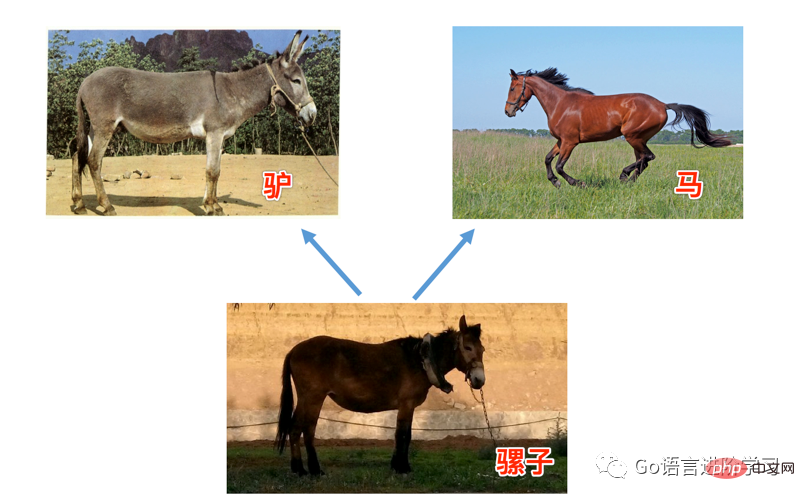Taking stock of inheritance and polymorphism in Python
1. Introduction to inheritance
Inheritance is a way to create a new class. The newly created class is called a subclass, and the inherited class is called a parent class, super class, Base class. The characteristic of inheritance is that subclasses can use the attributes (features, skills) of the parent class. Inheritance is the relationship between classes.
Inheritance can reduce code redundancy and improve reusability.
In real life, inheritance generally refers to children inheriting the property of their parents, as shown below:

##2. How to use inheritance?
1. Inheritance syntax
#Class Derived class name (base class name): #The base class name is written in brackets.
In the inheritance relationship, the existing and designed class is called the parent class or base class, and the newly designed class is called the subclass or derived class. A derived class can inherit the public members of the parent class, but cannot inherit its private members.
2. Characteristics of inheritance
In inheritance, the constructor of the base class ( init() method) will not be called automatically, it needs to be called specifically in the construction of its derived class.
If you need to call a base class method in a derived class, use the "base class name. method name ()" method to achieve it, and you need to add the class name prefix of the base class. , and the self parameter variable needs to be brought. Different from calling ordinary functions in a class, there is no need to bring the self parameter. You can also use the built-in function super() for this purpose.
Python always first searches for the method of the corresponding type. If it cannot find the corresponding method in the derived class, it starts to search one by one in the base class ( First look for the method to be called in this class, and if you can't find it, look for it in the base class).
3. Single inheritance
3.1 Single inheritance
Example:
class Animal: #父类
def eat(self):
print("-----吃-----")
def drink(self):
print("-----喝-----")
class Dog(Animal): #子类继承父类
"""
def eat(self):
print("-----吃-----")
def drink(self):
print("-----喝-----")
"""
pass
class Cat:
pass
wang_cai = Dog()
wang_cai.eat()
wang_cai.drink()Run result:

3.2 Multi-layer inheritance
Example:
class Animal:
def eat(self):
print("-----吃-----")
def drink(self):
print("-----喝-----")
class Dog(Animal):
def bark(self):
print("-----汪汪叫------")
class XTQ(Dog):
"""定义了一个哮天犬 类"""
pass
class Cat(Animal):
def catch(self):
print("----捉老鼠----")
xtq = XTQ()
xtq.eat()
xtq.bark()Run result:

3.3 重写父类方法
例:
class Animal: #父类
def eat(self):
print("-----吃-----")
def drink(self):
print("-----喝-----")
class Dog(Animal):
def bark(self):
print("-----汪汪叫------")
class XTQ(Dog): #重写Dog方法
"""定义了一个哮天犬 类"""
def bark(self):
print("----嗷嗷叫-----")
class Cat(Animal):
def catch(self):
print("----捉老鼠----")
xtq = XTQ()
xtq.eat()
xtq.bark()运行结果:

4. 多继承
4.1 多继承

从图中能够看出,所谓多继承,即子类有多个父类,并且具有它们的特征。
Python中多继承的格式如下:
# 定义一个父类
class A:
def printA(self):
print('----A----')
# 定义一个父类
class B:
def printB(self):
print('----B----')
# 定义一个子类,继承自A、B
class C(A,B):
def printC(self):
print('----C----')
obj_C = C()
obj_C.printA()
obj_C.printB()运行结果:
----A---- ----B----
Python中是可以多继承的,父类中的方法、属性,子类会继承。
想一想:
如果在上面的多继承例子中,如果父类A和父类B中,有一个同名的方法,那么通过子类去调用的时候,调用哪个?
#coding=utf-8
class base(object):
def test(self):
print('----base test----')
class A(base):
def test(self):
print('----A test----')
# 定义一个父类
class B(base):
def test(self):
print('----B test----')
# 定义一个子类,继承自A、B
class C(A,B):
pass
obj_C = C()
obj_C.test()
print(C.__mro__) #可以查看C类的对象搜索方法时的先后顺序运行结果:

5. 多态
5.1 什么是多态?
多态的概念是应用于Java和C#这一类强类型语言中,而Python崇尚“鸭子类型”。
所谓多态:定义时的类型和运行时的类型不一样,此时就成为多态。
Python伪代码实现Java或C#的多态。
5.2 案例
Python “鸭子类型”
class Duck:
def quack(self):
print("Quaaaaaack!")
class Bird:
def quack(self):
print("bird imitate duck.")
class Doge:
def quack(self):
print("doge imitate duck.")
def in_the_forest(duck):
duck.quack()
duck = Duck()
bird = Bird()
doge = Doge()
for x in [duck, bird, doge]:
in_the_forest(x)运行结果:

三、总结
本文以生活中的基础现象为切入点,主要介绍了Python基础中继承和多态,包括单继承、多继承的语法、多态常见的 “鸭子类型”、 以及如何重写父类的方法都做了详细的讲解。
The above is the detailed content of Taking stock of inheritance and polymorphism in Python. For more information, please follow other related articles on the PHP Chinese website!

Hot AI Tools

Undresser.AI Undress
AI-powered app for creating realistic nude photos

AI Clothes Remover
Online AI tool for removing clothes from photos.

Undress AI Tool
Undress images for free

Clothoff.io
AI clothes remover

AI Hentai Generator
Generate AI Hentai for free.

Hot Article

Hot Tools

Notepad++7.3.1
Easy-to-use and free code editor

SublimeText3 Chinese version
Chinese version, very easy to use

Zend Studio 13.0.1
Powerful PHP integrated development environment

Dreamweaver CS6
Visual web development tools

SublimeText3 Mac version
God-level code editing software (SublimeText3)

Hot Topics
 1378
1378
 52
52
 How to use Debian Apache logs to improve website performance
Apr 12, 2025 pm 11:36 PM
How to use Debian Apache logs to improve website performance
Apr 12, 2025 pm 11:36 PM
This article will explain how to improve website performance by analyzing Apache logs under the Debian system. 1. Log Analysis Basics Apache log records the detailed information of all HTTP requests, including IP address, timestamp, request URL, HTTP method and response code. In Debian systems, these logs are usually located in the /var/log/apache2/access.log and /var/log/apache2/error.log directories. Understanding the log structure is the first step in effective analysis. 2. Log analysis tool You can use a variety of tools to analyze Apache logs: Command line tools: grep, awk, sed and other command line tools.
 Python: Games, GUIs, and More
Apr 13, 2025 am 12:14 AM
Python: Games, GUIs, and More
Apr 13, 2025 am 12:14 AM
Python excels in gaming and GUI development. 1) Game development uses Pygame, providing drawing, audio and other functions, which are suitable for creating 2D games. 2) GUI development can choose Tkinter or PyQt. Tkinter is simple and easy to use, PyQt has rich functions and is suitable for professional development.
 PHP and Python: Comparing Two Popular Programming Languages
Apr 14, 2025 am 12:13 AM
PHP and Python: Comparing Two Popular Programming Languages
Apr 14, 2025 am 12:13 AM
PHP and Python each have their own advantages, and choose according to project requirements. 1.PHP is suitable for web development, especially for rapid development and maintenance of websites. 2. Python is suitable for data science, machine learning and artificial intelligence, with concise syntax and suitable for beginners.
 How debian readdir integrates with other tools
Apr 13, 2025 am 09:42 AM
How debian readdir integrates with other tools
Apr 13, 2025 am 09:42 AM
The readdir function in the Debian system is a system call used to read directory contents and is often used in C programming. This article will explain how to integrate readdir with other tools to enhance its functionality. Method 1: Combining C language program and pipeline First, write a C program to call the readdir function and output the result: #include#include#include#includeintmain(intargc,char*argv[]){DIR*dir;structdirent*entry;if(argc!=2){
 The role of Debian Sniffer in DDoS attack detection
Apr 12, 2025 pm 10:42 PM
The role of Debian Sniffer in DDoS attack detection
Apr 12, 2025 pm 10:42 PM
This article discusses the DDoS attack detection method. Although no direct application case of "DebianSniffer" was found, the following methods can be used for DDoS attack detection: Effective DDoS attack detection technology: Detection based on traffic analysis: identifying DDoS attacks by monitoring abnormal patterns of network traffic, such as sudden traffic growth, surge in connections on specific ports, etc. This can be achieved using a variety of tools, including but not limited to professional network monitoring systems and custom scripts. For example, Python scripts combined with pyshark and colorama libraries can monitor network traffic in real time and issue alerts. Detection based on statistical analysis: By analyzing statistical characteristics of network traffic, such as data
 Python and Time: Making the Most of Your Study Time
Apr 14, 2025 am 12:02 AM
Python and Time: Making the Most of Your Study Time
Apr 14, 2025 am 12:02 AM
To maximize the efficiency of learning Python in a limited time, you can use Python's datetime, time, and schedule modules. 1. The datetime module is used to record and plan learning time. 2. The time module helps to set study and rest time. 3. The schedule module automatically arranges weekly learning tasks.
 Nginx SSL Certificate Update Debian Tutorial
Apr 13, 2025 am 07:21 AM
Nginx SSL Certificate Update Debian Tutorial
Apr 13, 2025 am 07:21 AM
This article will guide you on how to update your NginxSSL certificate on your Debian system. Step 1: Install Certbot First, make sure your system has certbot and python3-certbot-nginx packages installed. If not installed, please execute the following command: sudoapt-getupdatesudoapt-getinstallcertbotpython3-certbot-nginx Step 2: Obtain and configure the certificate Use the certbot command to obtain the Let'sEncrypt certificate and configure Nginx: sudocertbot--nginx Follow the prompts to select
 How to configure HTTPS server in Debian OpenSSL
Apr 13, 2025 am 11:03 AM
How to configure HTTPS server in Debian OpenSSL
Apr 13, 2025 am 11:03 AM
Configuring an HTTPS server on a Debian system involves several steps, including installing the necessary software, generating an SSL certificate, and configuring a web server (such as Apache or Nginx) to use an SSL certificate. Here is a basic guide, assuming you are using an ApacheWeb server. 1. Install the necessary software First, make sure your system is up to date and install Apache and OpenSSL: sudoaptupdatesudoaptupgradesudoaptinsta




